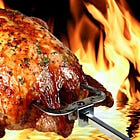Welcome to the concluding post of our special series about holistic nutrition and some of the research behind the Whole Food Plant Based Diet.
To learn more about the series, check out the Introduction here. This is not just another polemic for or against veganism!
These posts are much longer and far more complex than my usual posts. You might find them boring – or the most interesting thing you’ve read in months.
Article sites and sources can be found in the PDF version attached at the end.
If you’ve followed along this series, I hope you’ve found a deeper appreciation for the complexity of nutritional research, particularly regarding the healthfulness of animal foods. Perhaps you’ve resonated with my pitch last week for a new “wholism” that embraces a wide variety of foods - animal and plant - and lifestyles, a wholism that’s open to engage with anything in God’s infinitely complex world.
I’m grateful to every Healthy Jew that reached out to share their reflections on this series. I’m actually pleasantly surprised how many people read and connected with these huge posts.
For example, one reader wrote:
Really appreciate this series. Thank you very much! Several years ago, [my husband] and I were vegans on the Forks Over Knives way of eating, all based on Dr. Campbell’s research. I love getting to truth and greater clarity. As an aside, there is greater chance of being humble when one is not thinking that they have the secret to health and everyone else has it wrong. We eat animal protein moderately. It’s eaten during times of simcha [joy, such as Shabbos and holidays] - nothing else comes close to its deliciousness. We also feel better after having it.
If you too learned something from the series, it would be awesome if you can share it in the comments below (or reply directly to this email).
Researching The China Study controversy recalls an approach to life I heard once from a wise man. He taught: “Always learn from everyone. Learn what you want to learn from them, and learn what you don’t want to learn from them.” I’ve learned so much from Dr. Campbell, both what I’ve learned from him about wholism and what I’ve learned not to learn from him.
Dr. Campbell has taught me the limitations of reductionist science in nutrition research, and the necessity to strive for a greater whole than can be found in the sum of its parts. But Dr. Campbell looked for that whole using the tools of modern science alone, and it seems to me that he ended up where he started: reductionism and all its limitations. As his critics demonstrated scores of times, the whole will never be found in the parts alone.
True wholism must include a willingness to look beyond the laboratory, at life itself. Of course, biological plausibility and observed correlations will always inform the wholistic researcher, but only to the extent they naturally synchronize with the historical, cultural, and culinary experience of humans.
True wholism will always seek to build as diverse a repertoire of healthy foods as possible, reflecting the diverse nature of the natural world. It won’t need to hide behind the jargon of the science of biology to be legitimate and understood, because it has a beautiful language of its own.
Thank you for reading Healthy Jew.
Here are 2 great paths to continue the journey:
Also check out this intro and index to explore hundreds of posts about our 3 Healthy Jew topics: Wellness with Wisdom, Land of Life (Israel), and Sensible Spirituality.
Finally, always feel free to reach out here with any comments, questions, or complaints:
I look forward to hearing from you!
Be well,
Rabbi Shmuel Chaim Naiman
Please note: All content published on Healthy Jew is for informational and educational purposes only. Talk to a qualified professional before taking any action or substance that you read about here.








